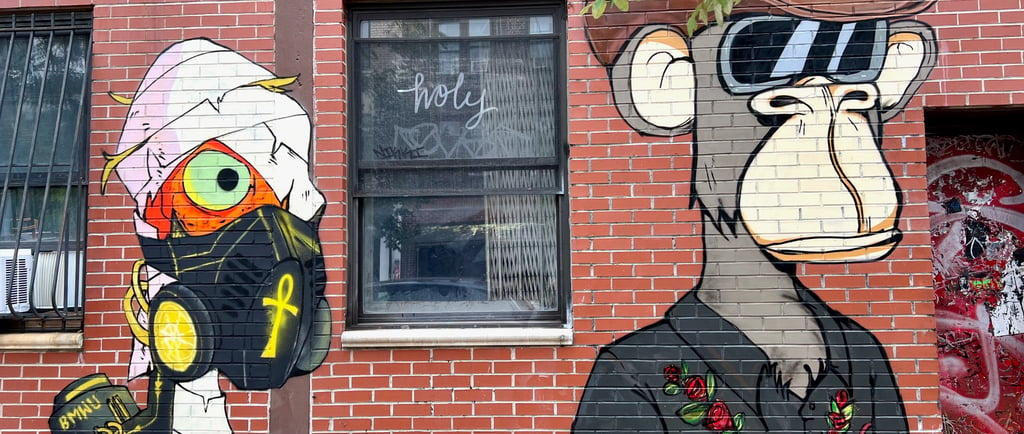Architects of intellectual capital
NFT Reality Check: When Your Digital Collectibles Become Securities (And Why the SEC is NOT Happy)
Tech and IP
TECHNOLOGY
Elizabeth Oyange
7/24/20255 min read


Remember when NFTs(Non Fungible Tokens) were the hottest thing since sliced bread? When everyone and their grandmother was minting digital art and flipping it for crazy profits? Well, plot twist: the Securities and Exchange Commission (SEC) has entered the chat, and they're not here to buy your rare Pepe. They're here to regulate, investigate, and potentially devastate the NFT market as we know it. Buckle up, because we're diving into the legal drama that's shaking the entire crypto world!
From Hype to Horror: The NFT Rollercoaster
Let's be real: NFTs went from zero to hero to... well, it's complicated. What started as a revolutionary way to own digital art and collectibles has become a legal minefield. The problem? The SEC is arguing that many NFTs aren't just digital collectibles—they're actually securities, which means they fall under strict financial regulations that most NFT creators and platforms never saw coming.
Think about it: you bought that cool NFT thinking you were just collecting digital art, but the government might consider it an investment contract. Suddenly, your innocent purchase could be part of an "unregistered securities offering." It's like finding out your Pokemon cards are actually stocks that should have been regulated by the government. Mind-blowing, right?
The OpenSea Shockwave: When the Biggest NFT Marketplace Gets a Warning
In August 2024, OpenSea—the Amazon of NFTs—received what's called a Wells Notice from the SEC. For those not fluent in legal jargon, a Wells Notice is basically the SEC saying, "Hey, we think you broke the law, and we're probably going to sue you." OpenSea's alleged crime? Selling NFTs that the SEC considers unregistered securities.
This wasn't just any company getting in trouble; this was THE platform where millions of people bought and sold NFTs. The implications were massive. If OpenSea was operating as an unregistered securities exchange, it could face enormous fines and be forced to completely restructure its business model.
OpenSea's response was epic: they didn't just lawyer up, they helped create a $6 million legal defense fund to help NFT creators and developers fight similar accusations. It was like a digital David vs. Goliath story, with the entire NFT community rallying against regulatory overreach.
The Flyfish Club Fiasco: When Restaurant NFTs Become Securities
Here's where things get really wild. The SEC went after Flyfish Club, a company that sold NFTs granting membership to an exclusive restaurant. Yes, you read that right—restaurant membership NFTs were deemed securities. The SEC argued that Flyfish marketed these NFTs as investments, telling buyers they could potentially profit by reselling them or leasing them to others for "passive income."
The case perfectly illustrates how the SEC is applying the Howey Test (a legal framework for determining what constitutes a security) to NFTs. According to this test, if you're investing money in a common enterprise with the expectation of profits from the efforts of others, congratulations—you've just bought a security, whether you knew it or not.
Flyfish ended up settling with the SEC, agreeing to destroy all remaining NFTs and stop collecting royalties from secondary sales. It was a stark warning to the entire NFT industry: the SEC is serious about enforcement, and they're not making exceptions for innovative business models.
The Class Action Avalanche: When Users Fight Back
The regulatory pressure isn't just coming from the government. Regular users are filing class-action lawsuits against NFT platforms, claiming they were deceived into buying unregistered securities. In September 2024, two OpenSea users filed a lawsuit alleging that the platform's NFT listings were "deceptive and misled the Plaintiffs into purchasing worthless and unlawful unregistered securities."
These lawsuits are particularly dangerous because they're coming from the very people who were supposed to benefit from NFTs. It's like your customers suing you for selling them exactly what they asked for, but claiming they didn't understand what they were buying. The legal arguments mirror the SEC's position: that many NFTs meet the criteria for investment contracts and should have been registered as securities.
Artists Fight Back: The Preemptive Strike
Not everyone is taking this lying down. In July 2024, musician Jonathan Mann and artist/law professor Brian L. Frye filed a preemptive lawsuit against the SEC, seeking a declaration that NFTs representing ownership of their artistic works are NOT securities. This was a bold move—essentially asking a court to rule on the issue before the SEC could take action against them.
Their lawsuit represents a broader frustration in the creative community. Artists who thought they were simply selling digital art are now facing the possibility that their work could be classified as financial instruments. It's like being told that selling paintings at an art fair might actually be operating an unlicensed investment business.
Hope on the Horizon: The NFT Act
There might be a light at the end of this regulatory tunnel. Congressman William Timmons introduced the New Frontiers in Technology Act (cleverly abbreviated as the "NFT Act") in September 2024. This bill aims to provide much-needed clarity by:
•Creating a definition for "covered NFTs" that excludes securities,
•Providing protections for NFTs primarily used as art and collectibles,
•Calling for a comprehensive study of NFTs by the Comptroller General.
If passed, this legislation could be a game-changer for the NFT industry, essentially telling the SEC to back off from certain types of NFTs. It would provide the regulatory clarity that creators and platforms desperately need.
Why This Matters to YOU, Digital Collector
Whether you're a seasoned NFT trader or someone who's just curious about digital collectibles, these legal developments will directly impact your future in the digital economy. Here's what you need to know:
Understand What You're Buying: Before purchasing any NFT, research whether it might be considered a security. Look for red flags like promises of profits, revenue sharing, or investment-like language in the marketing.
Know Your Rights: If you've bought NFTs that might be securities, you could have legal recourse if they weren't properly registered. Keep records of your purchases and any marketing materials you relied on.
Stay Informed: The regulatory landscape is changing rapidly. What's legal today might not be tomorrow, and vice versa. Follow reliable sources for updates on NFT regulations.
Support Sensible Regulation: Advocate for laws that protect consumers without stifling innovation. The NFT Act is a good example of balanced legislation that could benefit everyone.
Think Long-Term: Don't let short-term regulatory uncertainty scare you away from digital ownership entirely. The technology behind NFTs has real utility beyond speculation, and clearer regulations could actually strengthen the market.
The Future of Digital Ownership
The NFT regulatory battle is really about something much bigger: the future of digital ownership and the creator economy. As our lives become increasingly digital, we need legal frameworks that protect consumers while allowing for innovation. The decisions made in the next few years will determine whether NFTs evolve into a legitimate part of the digital economy or remain a niche curiosity.
As of mid-2025, Kenya operates largely within a regulatory vacuum concerning NFTs. Although copyright laws recognise them, there is no dedicated, comprehensive legal framework specifically enacted to govern Non-Fungible Tokens. This absence of bespoke legislation means that NFTs do not fit neatly into existing legal categories, leading to significant uncertainty for creators, investors, platforms, and consumers alike. The Virtual Assets Service Providers (VASP) Bill 2025, represents the most significant step towards regulating virtual assets in Kenya. The Finance Bill 2025 further proposes a tax of 1.5% on all transfers of digital assets and NFTs.
Policy recommendations should address a categorisation framework for NFTs based on their characteristics and intended use. For example it could distinguish between:
•Utility NFTs: NFTs that grant access to a service, product, or experience (e.g., event tickets, membership tokens).
•Art/Collectible NFTs: NFTs primarily representing digital art, collectibles, or unique digital items with no inherent expectation of profit from the efforts of others.
•Security NFTs: NFTs that meet the criteria of a security (e.g., fractionalized NFTs, NFTs linked to profit-sharing schemes, or those marketed as investment vehicles). These should be subject to existing or adapted securities laws.
•Payment NFTs: NFTs used as a medium of exchange, which would fall under payment systems regulations.
What do you think? Should NFTs be regulated as securities, or are they fundamentally different from traditional investments? How can we protect consumers without killing innovation? And what role should the government play in regulating digital collectibles?
IPQUAIL
Kenya's leading boutique intellectual property law consultancy. Protecting trademarks, patents, copyright, and innovations across East Africa.
COMPANY
Contact us
info@ip-quail.com
+254 743549257
© 2026. All rights reserved.
Architects of intellectual capital
SERVICES
LEGAL
Trademark Registration
Patent Drafting and filing
Copyright Protection
Data Protection
IP Commercialization
IP Audit
IP Valuation
IP Management and strategy
